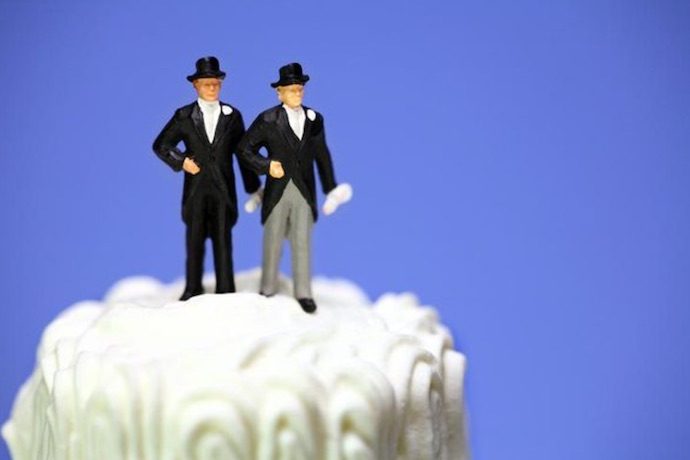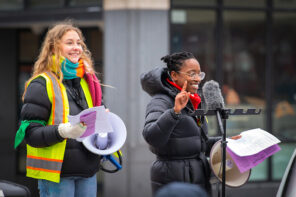It might be tempting to think that Masterpiece Cakeshop v. Colorado Civil Rights Commission—the upcoming Supreme Court case about a baker who refused to make a custom cake for a same-sex wedding reception—pits religious believers against the nonreligious. After all, Jack Phillips, the baker at the heart of the case, has cited his Christian faith and his attorneys have argued that Phillips “seeks to live his life, pursue his profession, and craft his art consistently with his religious identity.”
But with more than 90 amicus briefs having been filed in the case—more than a dozen of them having been written on behalf of religious institutions and groups of religious leaders—the story is not so tidy. While it’s true that the majority of the briefs by religious authors have taken the side of the baker, others have championed the cause of Charlie Craig and David Mullins, the couple to whom Phillips denied service.
Because Masterpiece Cakeshop, like most of the arguments against same-sex marriage that have appeared in our public discourse over the past several decades, has been explicitly, or at least implicitly, religious in nature, we often assume that the fight over same-sex marriage is essentially a contest between religious and secular perspectives. But the story of religious advocacy for same-sex marriage and the rights of LGBTQ+ individuals is seldom highlighted. Indeed, some mainline Protestant denominations like the United Church of Christ, the Evangelical Lutheran Church of America, and the Episcopal Church, along with the Reform branch of Judaism, perform same-sex weddings, ordain LGBTQ+ clergy, and have advocated for gay rights in the secular sphere.
Consider the amicus brief filed by five progressive Protestant denominations and a Christian seminary. It begins by staking the claim that “respect for religious liberty does not require upholding [Phillips’s] claim to a religious exemption from Colorado’s generally applicable public accommodations law.” The Supreme Court has long held, going back to a late-nineteenth-century suit by a Mormon believer who argued that Utah’s prohibition against bigamy threatened his right to practice his faith, that when a law is “generally applicable”—that is, when it doesn’t single out any particular religious group—it is constitutional for such a law to burden some individuals’ religious practices when the government has a compelling interest at stake.
That’s the kind of argument the progressive denominations are making here: the Colorado antidiscrimination law under which Phillips was cited doesn’t single out conservative Christians, but rather seeks broadly to prohibit discrimination on the part of any citizen.
But in their brief, the denominations proceed to make another, perhaps unexpected argument: that “[p]ublic accommodations laws like Colorado’s generally promote religious liberty, by protecting individuals from discrimination on account of their religion. Such laws also promote human dignity, which is itself a religious value” (italics theirs). In doing so, they draw a parallel with a series of cases from the 1960s in which the Court upheld the constitutionality of laws that advance the government’s interest in prohibiting discrimination on account of race, even when those who sought to treat people of color differently have claimed that they were doing so on account of religious convictions. Laws that require businesses like hotels, restaurants, and, yes, even bakeries to treat all their customers equally “safeguard the ability of each citizen to participate fully in society with dignity.” To the contrary, a decision in Philips’ favor could give sanction to those who, relying on their religious beliefs, might refuse to serve others of a different faith, or of no faith.
The denominations are careful to note that there are situations involving religious practice where the First Amendment clearly prohibits the government from interceding to enforce nondiscrimination laws. An Orthodox rabbi, for instance, should not be forced to solemnize the marriage of a Jew and a non-Jew, and a Catholic bishop should not be required to ordain a woman, because both of these cases would require the government to intervene directly in a religious community’s ritual practices. But, they note, the Colorado antidiscrimination law at issue in Masterpiece Cakeshop already exempts places that are “principally used for religious purposes” from its definition of a place of public accommodation.
Another amicus brief, this one joined by Reform and Reconstructionist rabbis and Muslim religious leaders, in addition to Protestants and Catholics, advances a similar set of arguments. But it also seeks to remind the justices that a “vast spectrum of American faith groups and religious observers” have supported the rights of same-sex couples, affirming that “[a]ny suggestion that ‘religion’ or ‘people of faith’ as a whole reject LGBT equality is false and, frankly, insulting to millions of Americans of faith.”
A third brief authored by religious civil rights advocates, including a number of Muslim organizations, expresses concern that a decision in Phillips’s favor might particularly jeopardize the rights of religious minorities, who would likely be disproportionately affected by what would amount to legalized discrimination. These authors cite Department of Justice and Equal Employment Opportunity Commission statistics on religious discrimination by employers, showing that such incidents tend to involve Muslims and Jews in significant numbers.
These, of course, are not the only kinds of arguments that religious believers are making in Masterpiece Cakeshop. Religious groups opposed to same-sex marriage, including the U.S. Conference of Catholic Bishops, the National Jewish Commission on Law and Public Affairs, and the Ethics and Religious Liberty Commission of the Southern Baptist Convention, have also weighed in, filing amicus briefs that outnumber those on the side of the couple. Some of these briefs argue that their religious traditions prohibit adherents from “assisting, in a meaningfully participatory manner,” in violations of religious law, and that laws like Colorado’s coerce believers into acting in defiance of their traditions; others cite instances where antidiscrimination laws have forced religious charities out of business; and still others seek to reinforce Phillips’s characterization of his activity as having been grounded in his customers’ conduct rather than their identity.
But regardless of what one might think of these and other arguments, the court filings in Masterpiece Cakeshop make plain that U.S. debates on gay rights and same-sex marriage cannot be pigeonholed as arguments between the religious and the secular. It is true that many of the country’s largest religious groups, especially the Roman Catholic and Southern Baptist churches, continue to vigorously oppose same-sex marriage and are ready to employ the language of religious liberty in cases like Phillips’s.
But, as survey after survey has demonstrated, substantial numbers of Catholics, and to a lesser extent evangelicals as well, are not following their denominations’ leaders down this particular road, and there is a growing number of religious institutions that have embraced marriage equality and advocated for LGBTQ+ rights in the public square. Cases like Masterpiece Cakeshop make it clear that the boundaries of a national settlement on gay rights remain fuzzy. As this vitally important conversation proceeds, let us not miss yet another opportunity to tell the story of religious advocacy, and not just religious opposition, with regard to the LGBTQ+ community.





